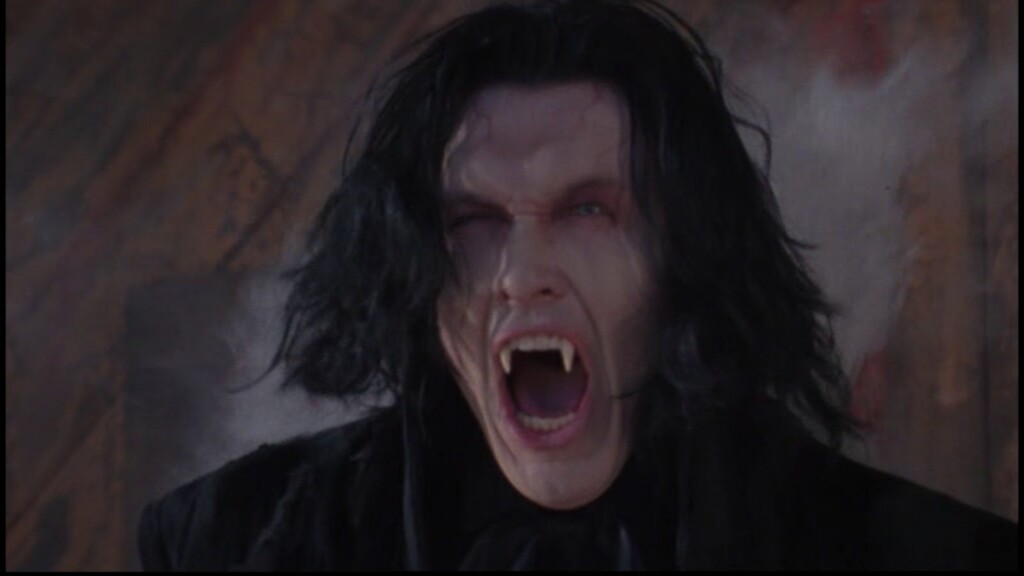By the end of the twentieth century, the bloom had come off the rose for John Carpenter. After dominating the entire horror genre in the 1980s, the 1990s proved to be less profitable for Carpenter, not to mention more creatively stultifying. Tepid box office returns and critical reception to Village of the Damned, In the Mouth of Madness (which remains one of his unheralded masterpieces), and Escape from L.A. had him contemplating retirement. Then like a bank robber vowing to make one final score, he told himself that if he didn’t have fun making Vampires, he’d give up the ghost. Carpenter had a lot of fun making Vampires, and it shows.
Vampires, for better or worse, often gets lumped in with Carpenter’s disappointing ’90s and ’00s; it’s most often seen of a piece with Escape from L.A. and Ghosts of Mars. That’s not exactly an unfair assessment, but it’s also not an entirely accurate one. This isn’t just a paid gig for Carpenter. There’s a certain intentional nastiness to Vampires, an unsentimental nature that recalls the opening scenes of Assault on Precinct 13. As he usually does, Carpenter composed to the score for this film, eschewing his trademark synthesizers in favor of a soundscape inspired by diverse sources ranging from Tejano guitars to the self-serious guitar bombast of Ennio Morricone. While Vampires might fall flat in more than a few places, its score is not one of them.

The elephant in the room, of course, is James Woods. It’s important to note that Woods has fashioned himself into a repugnant right-wing troll, a man who cackles over the deaths of his critics and now finds himself in such august company as the Jon Voights and Dean Cains of the world. That being said, he was inescapable in the 1990s, and it took a certain kind of director to know how to properly utilize his inherent sleaziness. Martin Scorsese did so in Casino, and Carpenter does it in Vampires. Woods plays Jack Crow, the leader of a band of Slayers, which operates a bit like a SWAT team that targets vampires. Yes, the concept is hokey (and not dissimilar to Blade, which came out just a month after Vampires), but that’s what makes Carpenter the right man for the material. Few directors are able to straddle the line between serious and absurd like Carpenter. His version of Christine knows that a haunted car is a silly idea, but it also argues that it can be scary as well. Big Trouble in Little China embraces its pulp-fiction roots while still maintaining a sense of heightening stakes.
In the film’s opening scene, Crow and his team take out a nest of vampires (“goons,” they’re referred to as), but strangely don’t find the master, the vampire that presides over the nest. Later, while partying at a motel, the master arrives and quickly massacres everyone save for Crow, his right-hand man Montoya, and Katrina, with whom Crow had a flirtation (Katrina does get bitten, though). These first two sequences are impressive; indeed, Vampires is almost episodic in nature, comprised of a series of set pieces. This is some of Carpenter’s gorier work (the film was almost branded with an NC-17 rating), but some of his most assured. The action is easy to follow, and the master vampire, Valek (played by Thomas Ian Griffith in a role that Brad Dourif would dominate) is swift and merciless.

Carpenter is less interested in making a horror movie than he is in making a bloody Western, and he succeeds in this (I think if a timeline started with Vampires, it would conceivably end with Bone Tomahawk). Crow and Montoya are never likable, and more often than not you find yourself rooting against them, simply because of their abhorrent behavior. Crow uses the f-slur more than once; he refers to Katrina as a “piece of shit” and a “whore”; he beats up a priest and then asks if it made the man aroused. Montoya, for his part, has Katrina tied up in a hotel room, which is understandable, but she’s also naked, which even he makes little attempt to justify. Montoy is a surprisingly layered character, backhand-slapping Katrina in one scene and defending her from Crow in the next. Daniel Baldwin does his best, but the nuances of the characters are beyond him (to be fair, the only Baldwin with acting talent is Alec, who was originally cast in this role).
For all its merits, there are some areas in which Vampires falls totally flat. It’s lit with the slick veneer of a TV movie, which might sound like a minor quibble, but ultimately it does distract from Carpenter’s unique score and able direction. The performances are mostly forgettable, save for Woods, but it’s hard to tell if that’s a good or a bad thing when you consider what he’s like as an actual person. But those minuses are outweighed by all of Vampires‘ qualities. It doesn’t earn the distinction of “hidden gem,” which might be applied to Prince of Darkness or In the Mouth of Madness, but it’s certainly better than you’ve heard. At the very least, we all owe Carpenter a debt of nightmares, and it’s great to watch him have fun scaring us again.

